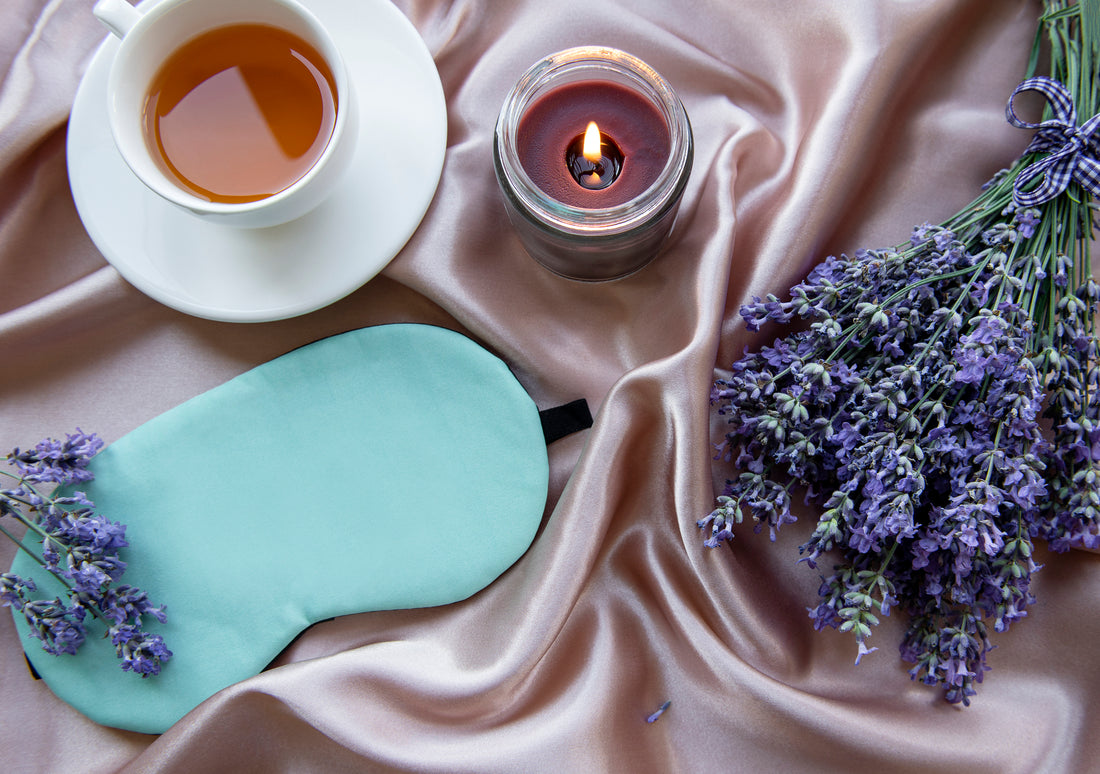Does Lavender Improve Your Sleep?

Key points:
- Lavender is a popular natural sleep remedy that is most often used in aromatherapy. It’s also available in the form of oral supplements and body care products.
- Lavender has a lot of health benefits and not only improves your overall sleep quality but also reduces stress and anxiety levels, lowers blood pressure, reduces pain, and improves cognitive function.
- Lavender oil is generally safe and doesn’t cause any side effects. However, it may cause headaches, constipation, and increased appetite if you use it in a supplement form. When applied topically, some people may experience skin irritation.
- Lavender may interact with certain medications and supplements, so it is not recommended for people with hormone-sensitive cancers or upcoming surgeries. Pregnant and breastfeeding women should also avoid using lavender oil.
Quality sleep is just as important for health as working out and having a clean diet. But unlike eating healthy and going to the gym, a lot of people deprioritise the importance of having a good night's sleep. This is a bad idea. Sleep directly affects your productivity and your overall well-being, so it’s crucial to maintain a healthy sleeping schedule. But what if you can’t fall asleep or wake up tired? In that case, there are hundreds of different oils, medications, supplements, and other remedies that can help you. In this article, we will take a look at lavender - one of the most popular natural remedies for sleep.
Lavender is a name of a group of perennial plants that contains more than 40 types of plants. Lavendula angustifolia is used specifically for medical purposes. While this plant is native to North Africa and the Mediterranean region, it’s now cultivated in all parts of the world, which makes it an accessible sleep remedy.

Lavender Health Benefits
For Sleep
As a sleep remedy, lavender is used in aromatherapy. It not only smells good but also has some powerful properties. Several scientific studies suggest that lavender improves overall sleep quality by helping you stay asleep longer and helping you wake up refreshed and alert. Lavender targets the central nervous system and promotes slow-wave sleep by interacting with the neurotransmitter GABA and, with that, lowering agitation, aggression, and fatigue.
Studies suggest that lavender improves sleep quality in people of all ages and can even be effective for babies and elderly people. For example, infants bathed in water with a few drops of lavender oil may be more relaxed after bathtime and have a deeper sleep at night. Lavender may also help with mild insomnia in college students.
For Anxiety and Stress
Lavender is also known to enhance mood and promote relaxation as it works as an anxiolytic and a sedative. A study that examined oral lavender supplements found that they can be as effective for improving sleep quality as taking a low dose of the sedative lorazepam. A small study conducted in an Indianapolis hospital found that lavender aromatherapy helps to reduce anxiety and depression in women with postpartum depression.
For Cognitive Health
There is some evidence that lavender aromatherapy and oral lavender supplements may improve cognitive functions, such as memory and alleviate symptoms of Alzheimer’s disease and dementia.
Reducing Menstrual and Menopause Symptoms
Recent studies suggest that lavender aromatherapy may also alleviate pain and other symptoms associated with menstruation. Research suggests that lavender may help with menopause symptoms such as sleep difficulties, anxiety, restlessness, and hot flashes.
Pain Relief
Oral lavender supplements can be taken for physical pain like headache, pain during labour, osteoarthritis pain, ear pain associated with an ear infection, post-surgical pain, and toothache. The herb acts as a natural analgesic and antibiotic. It’s also included in skincare products to help treat wounds as it has anti-bacterial and anti-inflammatory capabilities.
For Blood Pressure
Lavender’s positive impact on the nervous system may be the reason why lavender lowers blood pressure and reduces heart rate.
Possible Side Effects Of Lavender
Lavender is considered safe as an oral, topical, or aromatherapy supplement. Some possible side effects of oral lavender are headache, constipation, and increased appetite. When applied topically, it may cause skin irritation.
Keep in mind that lavender oil may act as an endocrine disruption and may have some effects on both oestrogen and testosterone levels in the body. That’s why parents should avoid or be cautious about exposing young boys to lavender oil.
Women who are pregnant and breastfeeding should also avoid using lavender oil since there’s a lack of information on the safety of lavender for these women.
People with upcoming surgery may also want to avoid lavender since, in combination with anaesthetic or other surgery-related medications, it may slow down the nervous system too much.
Because lavender interacts with hormones, it’s not recommended for people with hormone-sensitive cancers.
Lavender Interactions With Drugs
Lavender can also interact with certain medications and supplements. People who take the following medications and supplements should consult with their healthcare provider about using lavender in the oral form:
- Anti-hypertensive drugs
- Chloral hydrate
- Pentobarbital
- Sedative medications
- Herbs and supplements for better sleep
- Herbs and supplements for lowering lower blood pressure

How To Use Lavender Oil For Sleep
There are two ways you can use lavender oil for better sleep - apply it topically or inhale it as part of aromatherapy. When applied topically, you should feel lavender’s effects about 20 minutes after application since it quickly absorbs into the skin. While lavender is a non-allergenic essential oil, if you have sensitive skin, do a 24-hour check on the inside of your upper arm. If you see skin irritation, dilute the essential oil in a carrier oil such as sweet almond or jojoba oil. You can also apply this oil by mixing it with your body lotion or body cream.
Inhaling lavender will provide an instant effect. You can either put a drop of lavender oil on the top lip right under your nose, rub it into your hands, or use a cold diffuser. As an option, put a few drops of lavender oil on a tissue and put it inside your pillowcase.
You can also use dried lavender sachets and keep them with your bedsheets. That way, your linen will have a subtle lavender scent.

Try B・SYNC ON
If you’re looking for natural remedies to improve your sleep cycle, it’s a good idea to try combining different supplements and essential oils. For example, you can use lavender oil to fall asleep and take B・SYNC ON to wake up energised.
Made with an innovative formula, B・SYNC ON is a natural supplement that helps you wake up easier every morning and gives you a boost of energy to supercharge your day. Using B・SYNC ON together with aromatherapy will ensure that you get a good night's sleep and a refreshed morning start.
B・SYNC ON contains natural active ingredients - vitamin B5, vitamin B12, zinc, and caffeine that are released 7-8 hours after you take the supplement, so you can take a pill before going to bed and wake up ready to take the day by storm. Try B・SYNC ON tablets today!
FAQ
Where do you put lavender oil for sleeping?
There are different ways you can use lavender to improve your sleep. For example, you can put it directly on your skin, put a few drops on a tissue and put it inside your bedsheets, or use a cold diffuser.
Can you apply lavender oil directly to the skin?
Yes, you can apply lavender oil directly to the skin, and it generally doesn’t cause any irritation. However, if you have sensitive skin, you may want to do a 24-hour patch test beforehand.
What are the side effects of inhaling lavender oil?
Lavender promotes relaxation and sleepiness and slows down breathing. It can also interact with some medications and supplements, so if you already take something for relaxation and sleep, lavender may strengthen the effect of that medication and cause breathing problems and/or too much sleepiness.
Do you need to dilute lavender oil?
In aromatherapy, you don’t need to dilute lavender oil since it’s considered non-irritating and safe. However, if you have sensitive skin and lavender oil causes irritation, dilute it with any carrier oil.
Who should not use lavender?
Lavender is not recommended for pregnant and breastfeeding women, people with hormonal cancers or upcoming surgery, and people who already take anti-hypertensive drugs, pentobarbital, and sedative medications, herbs, or supplements. Lavender also acts as an endocrine disruptor and is not recommended for young boys.







